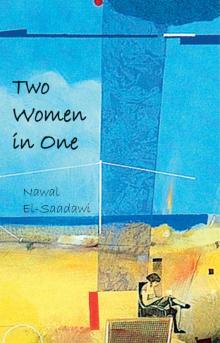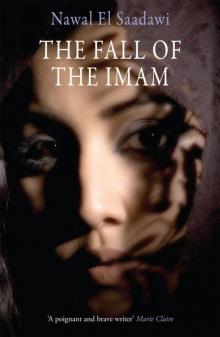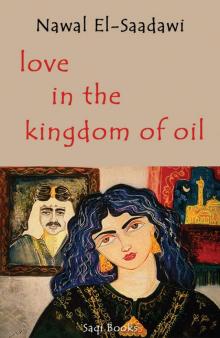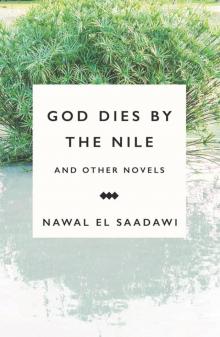- Home
- Nawal El Saadawi
Two Women in One Page 5
Two Women in One Read online
Page 5
A female student whispered in her ear, ‘He’ll cane you with a ruler.’
Another laughed, clapping her hand over her mouth, ‘He’ll dissect you with his forceps.’
A third leaned forward and said, ‘He’ll tear you to pieces.’
A fourth sighed, ‘Lucky you — I wish it was me!’
Moans, groans, sighs, and gasps, a hidden burning desire buried within her like a germ that sought to torture her body, rip it apart, destroy it so completely that nothing would remain.
She followed him into his office. He had already taken off his white coat and spectacles. The tension had gone out of the lecturer, who now stood as an athletic young man, slim and with a pale complexion, now reddish in the gleaming sunlight. His eyes were wider than usual, as if he was surprised: ‘What’s the matter with you these days, Bahiah? This is not the Bahiah we used to know.’ She shuddered in panic, as if he had stripped off her clothes and glimpsed part of her so private that she had concealed it from others’ eyes and kept it for herself alone. Pulling the collar of her blouse up around her neck, she said angrily, ‘I’m the same as usual.’
He replied in the quiet tone of the confident lecturer, ‘What about skipping your anatomy classes?’
‘I was busy with the exhibition.’
‘No, Bahiah. It’s not the exhibition. You’re busy with something else.’
Her lips parted in astonishment, but she pursed them quickly, as if angry. She turned to leave, but he blocked the way and continued to lecture her. ‘You’re busy with something else, Bahiah.’
She raised her eyes to his: ‘No.’
As if he had not heard her reply, he asked in a quiet, confident voice, ‘What’s bothering you, Bahiah?’
‘Nothing’, she said again.
There was something between herself and Dr Alawi — something unspecified and incomprehensible but nevertheless real and palpable. She sensed it in his blue eyes when he looked at her, and in his voice when he spoke to her. Sometimes she wondered what it could be. She had seen him once in a dream. He was wearing a shirt and trousers and he was as slim as an athlete. His arm was hairy and looked reddish in the sunlight. He picked her up and tried to embrace her, but she slipped away. He put his arms round her, tore her hands from her mouth, and kissed her. She pushed him away, only to find there was no one there. She had been dreaming. She was surprised that Dr Alawi could force himself on her in her dreams, whereas she did not desire him when awake — on the contrary, she loathed him. She detested his piercing blue eyes and his laugh. He did not laugh like other people. His laugh was dignified and masterful. His guffaw was fake and abrupt. No sooner had it started than it was cut off. He always made people feel as if he was a lecturer, someone who knew what they did not and owned what they did not. He mounted the podium with steps like other lecturers: slow, self-confident, even relaxed. His bottom was a little flabby from sitting too long on comfortable chairs.
One of his hairy reddish hands was on the door knob, the other on her shoulder, patting it as teachers do their students. But now his hand rested there a moment, a quick touch like an involuntary contraction of the muscles. There was a slight tremor in his voice as he said, ‘Bahiah, you know I care about you.’
He collected himself quickly, resuming his quiet confident lecturer’s tone: ‘Exams are coming up soon. And I want you to pass.’
At the tram stop she looked at her watch. Half past three. Her heart pounded. As she reached in her pocket, her fingertips found the hard metal edge. She withdrew her hand, shaking, as if she were carrying a bomb that would explode the moment she touched it, blowing her body to pieces on the asphalt. As the tram drew near, with its crowds and noise, she kept her distance from the others, so that no one would collide with her. Then she changed her mind and decided to walk home.
After Qasr al-Aini street, she headed for Nile Street. The sun shone on the river’s surface, while the warm air caressed her face, bringing a light refreshing humidity. She closed her eyes under its warmth. The Corniche was deserted at that hour of the afternoon. The windows of the houses were closed, their shutters drawn, not a soul inside or out. The sounds of her footsteps on the asphalt rang in her ears with that familiar regular beat. But what sounded familiar to her ears seemed strange to her mind. The tapping on the asphalt came not from her own feet, but from others behind her. She turned, but there was no one. She felt almost disappointed, as if they had arranged to meet and he had not turned up. But she knew he was not behind her, that he was waiting for her in his flat at al-Muqattam, any time after three.
She glanced at her watch. Quarter to four. Her heart thumped and then stopped. Her black eyes looked up, her long thin face was pale and her short black hair fell over her neck and ears. Her delicate shoulders were softly rounded under her blouse. Her small breasts rose and fell with each breath and her red fingers clutched her leather satchel bulging with anatomy textbooks.
She came to Fam al-Khaleej Square. Before her was Nile Street and the bridge leading to her home in Rowdah. On her right was the Nile, on her left the road leading to al-Muqattam. Anyone seeing her would have expected her to turn left. But she did not. She remained standing where she was. She knew that to turn would be a matter of supreme importance. It would mean that she was Bahiah Shaheen no longer, that she had become that other, stronger being, equally desired and feared.
It was a dreadfully momentous time, which seemed like death. No, it was a kind of death — one person was dying and another being born — a brief moment if she would turn left. All she had to do was raise her foot, move it over the ground and bring it down again: no more than an instant, yet it seemed a lifetime to her, like all the years of her life so far and all the years she would have in the future, as if her whole life lay at her feet and she had only to step down and she would crush it to pulp, to soft ashes.
The street on her left was no longer a street. For streets, like everything else, change minute by minute according to our view of the world, the pulse in our veins, the change in the air with every new breath, and the surge of the sea with every wave. The street lengthened and protruded from the belly of the mountain like an outstretched arm. Above it, caught between the mountains and the buildings, a strip of sky formed a second arm. The two huge arms, like those of the mythical god, stretched out before her like the gaping jaws of fate, extending toward the horizon, lying in wait for her, willing her body to turn to them.
She longed to throw herself into those outstretched arms. But her body held fast and she was unable to lift her foot from the ground. She shuddered in panic and her satchel fell, the anatomy books scattering all over the road.
From the corner of her eye she saw the white label on the cover: Bahiah Shaheen, 1st Year Anatomy. Her arms seemed to shrink. They refused to pick up the books, but with her body still bent over the pavement she manged to gather them up and put them in her bag. Stooping over was enough to bring back Bahiah Shaheen full force. That other person disappeared down the long corridor and her feet quickly began to head towards home with determination.
As she walked her body’s movement seemed strong and victorious, but her true feeling was entirely different. She felt defeated, and when she saw her house in the distance her heart sank, as though she were a lifer being led to prison, driven by an irresistible force as strong as steel. She felt chains around her hands, feet, wrists, ankles and neck, pulling her mercilessly towards that small red house.
Her home, her room and her bed were now no longer her own. Objects, like people, change not only in form but in meaning too. We never know the reality of things: we see only what we are aware of. It is our consciousness that determines the shape of the world around us — its size, motion and meaning.
She had thought of her home as a safe refuge from the crowds on the tram and at college, from the sun’s heat and the winter cold, a place where her father would give her her daily pocket money, her mother would feed her, where her brothers’ features mirrored her own. Everything ar
ound her evoked serenity. But now the house had become a prison, her father a guard, sitting on his bamboo chair watching her every movement, and trying to detect her secrets from her expression. Her personal papers in the drawers of her desk and under her pillow were covered with the prints of her mother’s fingers, searching for her secrets, looking for love letters or her boyfriend’s photograph. Her sisters’ eyes besieged her with questions. Even worse were the almost daily visits of her uncle, his wife and their son — the business school graduate who since childhood had been picked as a potential suitor, with his silly smile and his murderous idiotic happiness.
Now she was sure that she did not belong to this family. The blood in her veins was not theirs. If blood was all that connected her to them, then she had to question that bond. She had to question the very blood that ran in her veins and theirs. Her mother had not given birth to her. Maybe she was a foundling, discovered outside the mosque. Even if her mother had conceived her — and whether or not her father had played a part in this — it did not mean that she belonged to them. Blood ties, she felt, were no bond at all, since they were no one’s choice. It was pure chance that she was her mother and father’s daughter; neither she nor they had chosen.
She did not know how she had arrived at this point of view, but she was sure of this one conclusion, that only human choice gives this bond any meaning. And from this she concluded something else: she wanted to establish some kind of bond with Saleem, something that would make him stop and come towards her when he saw her among thousands of others, something that would make her, alone among thousands, stop and come towards him. This deliberate movement towards him was the only thing that would give meaning to that bond, the only thing that would give her life meaning — otherwise what sense did it have?
She had had no clear purpose. She had never known exactly what she wanted from life. All she knew was that she did not want to be Bahiah Shaheen, nor be her mother and father’s daughter; she did not want to go home or to college, and she did not want to be a doctor. She was not interested in money, nor did she long for a respectable husband, children, a house, a palace or anything like that. What did she want then?
Bahiah Shaheen’s mind was not her own. But she had another mind. She could feel it in her head, a swelling thing that filled her skull, impishly and secretly telling her that all these things were worthless and that she wanted something else, something different, unknown but definite, specific yet undefined, something she could draw with the tip of her pen on the blank sheet of paper like an individual black line. But when she looked at it, it became a long line stretching as far and wide as the horizon, with no beginning and no end.
She wandered the streets like a lost soul. Like a particle of air lost among millions of others floating in a void, she surrendered herself to the wind and was blown back and forth. It may have seemed as if she had abandoned herself to the sensation of being lost, as though she relished her own dissolution and annihilation, but inwardly she resisted, tensing her muscles and fending off the random motion. She refused to submit to it; she forbade her feet to move; with all her might she fought to stop.
She found herself standing like a wild pony, her tall slim body erect, her black eyes looking up, her black hair falling over her forehead, ears and the nape of her neck. Her nose was straight and sharp, her lips pursed in anger. She looked round to see where she was. But she had never been here before. Nor had she ever seen the house, nor the people around her, who came and went in a never-ending stream. Nobody knew her and she knew no one. The blood pounded through her heart. Her breath came in great gulps as if she were drowning. Life around her had turned into permanent liquidity, water above and below, and her hands and feet found no solid purchase.
She reached out with shaking, panicky fingers as though thrashing in the water for a lifeline. When her hand touched the edge of her pocket, her fingers curled around the metal key and gripped it firmly, as if to make sure it was really there; its solidity seemed to reassure her that something in life was tangible, something could be grasped in the fingers.
With the speed and force of a drowning woman gripping a solid object, her body was driven, her feet strode steadily and quickly over the asphalt, and her eyes searched the jungle of streets for that protruding arm stretching between the horizon’s heart and the blue sky caught between the buildings and the mountain. As she ran, she glanced at her watch: half past four. Her heart pounded and her chest rose and fell as her feet flew after each other, as if they were racing her breath.
A small door with a green branch of ivy hanging above it. As it opened, she saw his long, thin face with its deeply etched features, tense and exhausted. It was as if he never slept or ate, as if his head bore the world’s burdens, as if his deep blue-black eyes with their penetrating gaze pierced all masks to reach inner depths.
‘Hello, Bahiah.’
His voice surprised her. The name ‘Bahiah’ had acquired great intimacy. It was unlike any other Bahiah’s name. It was hers to the exclusion of millions, she with her special being standing here on the west side of the room.
There was almost no furniture, just a big sofa in the corner, a table with a vase of roses, and the wide window with the towering mountain beyond. She sat on the sofa; he turned to close the door. His back was to her and she could no longer see his face, eyes or gestures. He seemed a stranger. When she heard the door close, she suddenly remembered that she was Bahiah Shaheen, hard-working, well-behaved medical student, and now she had turned up at the house of a strange man with a back just like other men and with no connection to her. She was amazed, as in a dream when you find yourself in a strange place for the first time, meeting strangers you have never met before.
Her brain started churning at dream speed, hurling up image after image. She imagined her father in his bamboo chair in the sitting room, sipping his morning coffee. He opens his newspaper, and finds that the naked body of his daughter Bahiah has been found in a bachelor’s flat in al-Muqattam. Her father thought the road between home and the college delineated Bahiah’s world, that she said her prayers, fasted, and studied four hours a day, that when a love song came over the radio she would turn it off, and that when any boy in the family teased her she would scold him. He thought she was unlike other girls, that her body was unlike others girls’, in fact, that she had no body at all, no organs, especially no sexual organs liable to be aroused or stirred by someone of the opposite sex.
Her mind baulked at imagining her father’s shock on seeing his polite, obedient daughter’s body naked, not in her own bedroom but in a young man’s flat. Not only he would see her, but so would thousands of others who read the morning paper, including the members of her vast family scattered across the country from Aswan to Alexandria (especially the peasants and the ones from Upper Egypt). Not to mention all the employees at the Ministry of Health: her father’s superiors and subordinates, who had been convinced over thirty years that he was an efficient superintendent with close family ties and an honourable reputation, that his sons and daughters were diligent and well-behaved, especially his hard-working medical-student daughter Bahiah.
She shuddered as in a dream: she knew she would willingly sacrifice all the years of her life to spare her father that shock, that she did not mind dying or being seen naked if only her father would never see or know. She loved her father in spite of everything, and when he handed her an old ten-piastre note every day, her heart sank. When she folded her fingers around the note which carried the smell of his sweat, she wanted to bury her face in her hands and weep, for she knew that he worked so hard for her and her brothers and sisters. Sometimes she saw him pushing his way through the crowds with his thin body and bowed back; and when he crossed the street with its swirling traffic she would shiver with fear that a car might hit him. Once she saw him standing on the steps of the monstrously overcrowded tram and she imagined that the steps would collapse under the hundreds of feet and her father’s body would be crushed under the wheels
. Once she had been to her father’s office at the Ministry of Health. She spotted him walking along the corridor behind his boss. His back was bowed, his neck muscles slack, and his head hung in submission, while his superior walked in front, his back straight, his neck muscles taut, his head tilted back arrogantly. She longed for the earth to swallow her up. Later when he sat near her on the tram and smiled, she did not smile back. She avoided his eyes until the next day, and when he handed her the sweaty, old note she nearly refused it. But finally she took it, feeling humiliated. When she managed to raise her eyes to his she saw an invisible, translucent tear.
As she jumped up he turned and there was his face directly before her, his eyes on hers. She was overwhelmed by that magical current, instantly felt that anything outside that moment was devoid of meaning and reality and that her whole life, past and present, was not really hers but belonged to some other person. She had no connection with the world she had lived in, with the people she had known, or with anything other than this face, with its blue-black eyes fastened on her, asserting her existence.
‘Saleem.’
Her voice in the room sounded strange, like the voice of somebody else. So did the name ‘Saleem’ sound strange, like someone else’s name. She repeated it several times in silence, to get used to its vibrations in her ears, and it sounded stranger every time. His name was Saleem and hers was Bahiah. His name sounded no stranger than her own. Names are so far from the reality of things. The senses are so hopeless in understanding feelings. What she felt for him went beyond the ability of her ears to hear, of her eyes to see, her nose to smell, and her fingers to touch. She realized that people have other senses, as yet undiscovered, that they lie latent in the inner self. But these other senses are more capable of feeling than the senses that are known to us. They are the real, natural senses, but they have never been developed by our upbringing, or by education, regulations, laws, traditions or indeed by anything at all. They are like a river flowing free without dams, or the rain pouring down from the sky, facing no barrier or obstacle until it is soaked up by the soil.

 Two Women in One
Two Women in One The Fall of the Imam
The Fall of the Imam Love in the Kingdom of Oil
Love in the Kingdom of Oil Zeina
Zeina God Dies by the Nile and Other Novels
God Dies by the Nile and Other Novels